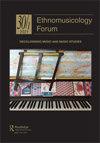Mindful playing: a practice research investigation into shakuhachi playing and meditation
IF 0.5
1区 艺术学
0 MUSIC
引用次数: 0
Abstract
ABSTRACT This article describes a practice research project investigating how the practice of meditation may be integrated into the playing of shakuhachi, an instrument utilised during the Edo period (1603–1867) as a tool for spiritual practice by monks of the Fuke sect and later becoming part of the hōgaku (Japanese traditional music) world as a stage instrument. Although we cannot know how the monks were trained to use the shakuhachi in meditation, I have combined my own shakuhachi and meditation experiences, in order to investigate how a shakuhachi player today may approach the incorporation of meditation in their musical practice. In transforming my experience into words, I here employ auto-elicitation, a micro-phenomenological interview technique developed by Claire Petitmengin to describe the subtle and fine-grained experiences of meditation while playing. The project here is regarded as a practice research within the field of ethnomusicology and challenges the narrow kind of scholarship in academia, which overshadows the practice research—the research of the act of playing music.正念游戏:对尺八游戏和冥想的实践研究调查
摘要本文描述了一个实践研究项目,研究如何将冥想实践融入沙八尺的演奏中。沙八尺是江户时期(1603-1867)福柯派僧侣用作精神练习工具的一种乐器,后来成为日本传统音乐世界的一部分,成为舞台乐器。虽然我们不知道僧侣们是如何被训练在冥想中使用沙八尺的,但我结合了我自己的沙八尺和冥想经验,以研究今天的沙八丈演奏者如何将冥想融入他们的音乐实践中。在将我的经验转化为文字的过程中,我在这里使用了自动启发,这是克莱尔·佩蒂门金开发的一种微观现象学采访技巧,用来描述玩耍时冥想的微妙而精细的体验。这里的项目被视为民族音乐学领域的一项实践研究,它挑战了学术界狭隘的学术,这掩盖了实践研究——演奏音乐行为的研究。
本文章由计算机程序翻译,如有差异,请以英文原文为准。
求助全文
约1分钟内获得全文
求助全文
来源期刊

Ethnomusicology Forum
MUSIC-
CiteScore
1.10
自引率
25.00%
发文量
29
期刊介绍:
Articles often emphasise first-hand, sustained engagement with people as music makers, taking the form of ethnographic writing following one or more periods of fieldwork. Typically, ethnographies aim for a broad assessment of the processes and contexts through and within which music is imagined, discussed and made. Ethnography may be synthesised with a variety of analytical, historical and other methodologies, often entering into dialogue with other disciplinary areas such as music psychology, music education, historical musicology, performance studies, critical theory, dance, folklore and linguistics. The field is therefore characterised by its breadth in theory and method, its interdisciplinary nature and its global perspective.
 求助内容:
求助内容: 应助结果提醒方式:
应助结果提醒方式:


